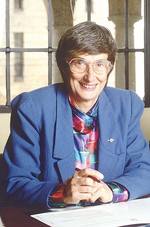Obituary: Fay Gale AO
Born: 13 June 1932, Balaklava
Died: 3 May 2008, Adelaide  Obituary Obituary
Fay Gale was a pioneer in many respects. Her passion for social justice and equality of opportunity was inspirational. Her research into indigenous issues opened up new areas of thought and research, the influence of which is still being felt 50 years on and more. Born Gwendoline Fay Gilding in Balaklava, South Australia, Fay studied at Methodist Ladies College and the University of Adelaide, where she was the first Honours graduate in the 50-odd years of teaching Geography at the University. At the time of her marriage in 1957, her bridesmaids were Gladys Long and Linda Vale, two Aboriginal women who had been taken from their mothers as babies and raised in a mission in the Northern Territory. When the girls left the mission, and came to Adelaide to find work, the Gales welcomed them as members of the family. This continued a pattern that went back to Fay's childhood, when Aborigines from the missions would stay with her parents when they travelled to the city. Three became foster sisters, friendships that Fay would cherish for the rest of her life. After graduating, she taught for a few years at Walford School, returning in 1957 to commence a PhD under the supervision of internationally acclaimed Australian geographer Sir Archibald Grenfell-Price. Her thesis, A study of assimilation: Part Aborigines in South Australia, was the first to explore the lives of part-Aboriginal women - the term then used for those who were of mixed descent - who had been taken from their mothers in infancy. Her field work steeled her resolve, and she would tell with despair how she once saw a baby torn off the breast of a woman at a fruit-picker's camp on the banks of the Murray. Published in 1960, the study was influential in the move towards citizenship and land rights for indigenous people, and the introduction in South Australia of the nation's first anti-discrimination act. Throughout the 1960s and '70s, while juggling life as a teacher and mother of two, Fay continued her research into Aboriginal people, especially the marginalisation of what came later to be called the Stolen Generation. She returned to work in the mid '60s as a lecturer in the Department of Geography at the University of Adelaide, and was quickly recognised as a gifted teacher. In 1972, her book Urban Aborigines was published. Its argument for Aboriginal self-determination radically altered public perceptions at a time Aboriginal land rights was increasingly high on the political agenda. In 1978 she became the first woman to be appointed to a professorship at the University of Adelaide, and one of only a handful of women Australia-wide. Professor Gale's research was relied upon by the Hindmarsh Island Royal Commission in making its determination. In these and in other controversial issues, she was subjected to severe criticism from both the State and Federal bureaucracies, and on more than one occasion she found herself vilified by the press and others; she not only continued her work, but expanded her focus. Professor Gale was the first woman to join the senior management of the University of Adelaide when in 1988 she was appointed Pro Vice-Chancellor. In 1989 she was recognised with the honour of Officer in the Order of Australia for her service to social science, particularly in the fields of geography and Aboriginal studies. Then in 1990 she was appointed Vice-Chancellor of the University of Western Australia, only the second woman to head an Australian university, and the first among the prestigious "sandstones". She counted her appointment to UWA and her achievements there as highpoints of her career. At a national level, she was a member of the Prime Minister's Science and Engineering Council, served on the Board of the Australian Research Council and represented Australia on the Council of the Association of Commonwealth Universities. In 1996 she became the first woman President of the Australian Vice-Chancellor's Committee. Following her retirement in 1997, Professor Gale took on the presidency of the Academy of the Social Sciences in Australia and was subsequently elected President of the Association of Asian Social Science Research Councils. She served on advisory boards for a wide range of causes. Fay Gale passed away at her Adelaide home, surrounded by her family, on 3 May. She has bequeathed to the community a legacy of tireless advocacy for justice and equity, respect for the land and its people, a love of learning, a bright smile, and a zest for life. While she will be missed, her impact will endure. Contributed by Professor Nick Harvey
|





